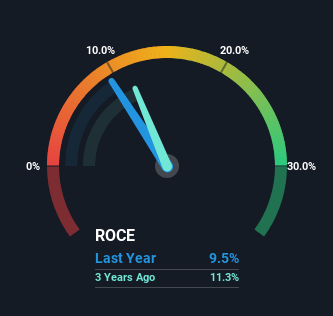There are a few key trends to look for if we want to identify the next multi-bagger. Amongst other things, we'll want to see two things; firstly, a growing return on capital employed (ROCE) and secondly, an expansion in the company's amount of capital employed. This shows us that it's a compounding machine, able to continually reinvest its earnings back into the business and generate higher returns. However, after investigating Rinnai (TSE:5947), we don't think it's current trends fit the mold of a multi-bagger.
Return On Capital Employed (ROCE): What Is It?
For those that aren't sure what ROCE is, it measures the amount of pre-tax profits a company can generate from the capital employed in its business. To calculate this metric for Rinnai, this is the formula:
Return on Capital Employed = Earnings Before Interest and Tax (EBIT) ÷ (Total Assets - Current Liabilities)
0.095 = JP¥45b ÷ (JP¥570b - JP¥99b) (Based on the trailing twelve months to June 2024).
So, Rinnai has an ROCE of 9.5%. In absolute terms, that's a low return, but it's much better than the Consumer Durables industry average of 6.9%.
View our latest analysis for Rinnai

Above you can see how the current ROCE for Rinnai compares to its prior returns on capital, but there's only so much you can tell from the past. If you'd like, you can check out the forecasts from the analysts covering Rinnai for free.
What The Trend Of ROCE Can Tell Us
In terms of Rinnai's historical ROCE trend, it doesn't exactly demand attention. The company has consistently earned 9.5% for the last five years, and the capital employed within the business has risen 37% in that time. Given the company has increased the amount of capital employed, it appears the investments that have been made simply don't provide a high return on capital.
The Bottom Line
Long story short, while Rinnai has been reinvesting its capital, the returns that it's generating haven't increased. Unsurprisingly, the stock has only gained 24% over the last five years, which potentially indicates that investors are accounting for this going forward. As a result, if you're hunting for a multi-bagger, we think you'd have more luck elsewhere.
On a final note, we've found 1 warning sign for Rinnai that we think you should be aware of.
While Rinnai may not currently earn the highest returns, we've compiled a list of companies that currently earn more than 25% return on equity. Check out this free list here.
New: AI Stock Screener & Alerts
Our new AI Stock Screener scans the market every day to uncover opportunities.
• Dividend Powerhouses (3%+ Yield)
• Undervalued Small Caps with Insider Buying
• High growth Tech and AI Companies
Or build your own from over 50 metrics.
Have feedback on this article? Concerned about the content? Get in touch with us directly. Alternatively, email editorial-team (at) simplywallst.com.
This article by Simply Wall St is general in nature. We provide commentary based on historical data and analyst forecasts only using an unbiased methodology and our articles are not intended to be financial advice. It does not constitute a recommendation to buy or sell any stock, and does not take account of your objectives, or your financial situation. We aim to bring you long-term focused analysis driven by fundamental data. Note that our analysis may not factor in the latest price-sensitive company announcements or qualitative material. Simply Wall St has no position in any stocks mentioned.
About TSE:5947
Rinnai
Manufactures and sells thermal equipment in Japan, the United States, Australia, China, South Korea, and Indonesia.
Flawless balance sheet established dividend payer.
Similar Companies
Market Insights
Community Narratives



